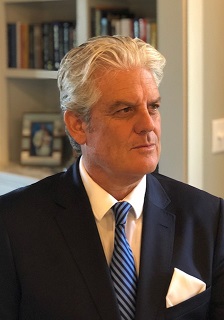From the CEO – September 2022

PRS tends to receive calls from clients and those interested in our risk data about how to use the 40+ year series to determine such items as returns on emerging market equities, hurdle rates for potential investments, and the utility of re-weighting the ICRG risk methodology so that some variables figure more prominently than others.
The latter has been particularly noteworthy of late, as many seasoned investors and firms understand that geopolitical risk assessment is a multi-layered and indeed nuanced effort that cannot be properly assessed via generalized opinions, regardless of how attractive such things might seem to our ears.
To this end – and given the almost global concerns over inflation – a recent study by Nicolay and Matheus (https://lnkd.in/g2CEzTnc) in the International Journal of Applied Economics is instructive. The authors’ aim was to use ICRG’s political risk variables to determine their relative effect on inflation. The empirical evidence was obtained through panel data analysis based on a sample of 90 countries for the period from 1990 to 2016.
Previous works have considered what shapes inflation and why it differs across countries largely from the perspective of economic or quasi-economic/structural factors. Some have pointed the relative independence of the central bank (Rogoff 1985; Grili et al. 1991; Cukierman et. al 1992); others underscore the extent of economic ‘openness’ in a country (Romer 1993; Lane 1997; Ball, 2006; Cox, 2007; Binici et al., 2012); still others look at the level of public debt (Catão and Terrones 2005; Lin and Chu 2013).
In the study by Nicolay and Matheus, the political factors derived from the ICRG are grouped into three ‘channels.’ The first channel (Governance Failure) refers to the impact government inefficiency has on inflation, as represented by the authorities’ inability to properly carry out its policy objectives and to fail over various uncertainties. The second channel (Partners Attitude) considers the external response of the countries over a specific country (an illustration of this channel is found below in the findings). The last channel (Cultural Conflict) focuses on social instability, which includes domestic and external conflicts in countries.
The study makes a solid contribution to the literature, and several findings stand out:
1/ In terms of Governance Failure, this political risk can shape inflation through a government’s inability to conduct fiscal and monetary policy (viz., it scores low on overall bureaucracy quality) and deal with corruption, which, in turn, can raise levels of social dissatisfaction and do little to help deteriorating socioeconomic conditions (e.g. growth in unemployment and poverty).
2/ On Partners Attitude and inflation, the results found that countries with lower government stability (e.g., the failure to carry out declared policies and hold low popular support levels) and a dubious investment profile (e.g. a government that is not committed to pay its liabilities) are more susceptible to higher levels of inflation, due to these uncertainties, thus leading to lower levels of external investment, as they represent a higher risk for their partners countries (viz., more probability of default).
3/ As it affects Cultural Conflict, the study found that when countries have a dominant religious group (viz., the ICRG measure of Religious Tensions) that seeks to replace civil law by religious law – and in so doing isolating other religious groups from the political process – there were certain spillover effects, including higher levels of ethnic tension, and internal and external conflict (e.g., terrorism and other forms of political violence). Such political shocks can result in a discontinuity of fiscal and monetary policy, thus creating the foundation for added price pressures.
* * *
We continue to receive considerable demand for the newest addition to our popular Researchers’ Dataset series – one that offers clients a more granular look at the political risk components of the ICRG, supported by 20 years of monthly data. The new series works as an excellent complement to the other data bundles announced this year affecting ESG, corruption, and internal/external conflict. Scores of academic studies have been conducted using these series, providing unique insights in asset volatility, government responses to the pandemic, and many more. Contact us for more information.
As the month came to a close, I had a very enjoyable meeting in Charleston with top officials from South Korea’s anti-corruption group. The discussion was lively, informed, with the agency displaying a very thorough understanding of the way forward for the country as it attempts to reduce graft from public dealings and private business matters.
I also enjoyed consultations with officials from one of China’s sovereign wealth funds, as well as JP Morgan’s Global Index Research Group, and professors and data scientists from the University of Pennsylvania. All lively discussions with some very talented individuals that explored the depths of the ICRG data series.
Happily, I will also soon be appearing on The Finance, Credit & International Business Associations (FCIB) Global Expert Briefing (GEB) series. These webinars are designed for the FCIB’s members to network and learn from experts in different areas in trade credit. I will occupy the slot of designated as ‘Political Hot Spots’’ in which I’ll discuss some of the more pressing and interesting geopolitical developments and their implications for credit professionals and others. A link to the series can be found here: https://fcibglobal.com/resources/global-expert-briefings.html
PRS’ new podcast series has begun, as I hosted Professor Brandon Parsons of the Graziadio Business School at Pepperdine University just as Hurricane Ian was about to make landfall. The discussion involved some of the new research by Dr Parsons on corporate taxation and income/wealth inequality, as well as the effect of corruption on economic growth. The interview will be posted shortly on PRS’ YouTube station, as well as on Linkedin and Twitter, and sent directly to the firm’s 60K plus followers and clients.
Our new book Quid Periculum? Managing Political Risk in an Age of Uncertainty, co-edited and co-authored by Peter Marber (Harvard/Aperture Investors) is now available! The book includes such diverse topics as risk forecasting techniques, reliability measures, the impact of political risk on asset prices and sovereign debt workouts. Also featured is a special roundtable discussion by some of the world’s leading voices in the field on the future of political risk, who combine to address some of the challenges presented by globalization and COVID-19.
September was another fruitful month for new and returning clients, ranging from some of the world’s top universities to the largest institutional investors throughout the US, Europe, the UK, and the Middle East and Asia. Our data are now regularly featured in the research of the IMF, Bank for International Settlements, and various central banks, such as the Bank of Italy.
Our ICRG political risk scoring changes were very robust in September, affecting some 100 countries (of 141) and over 115 individual political risk metrics!!
* * *
ICRG and related PRS data continue to be the gold standard of all geopolitical risk data among the scholarly and research communities. In a recent study on the so-called ‘channels of political risk’ and their relative effect on inflation levels, a factor analysis on the risk metrics of the ICRG and a panel data analysis based on a sample of 90 countries from 1990 to 2016, were used to reveal some significant findings.
For example, lower levels of government stability and a weaker investment climate (two of the ICRG risk categories) produce more inflationary pressures than would be the case otherwise. Similarly, military governments – given the effect on defense spending – also have a negative effect on fiscal probity. (https://lnkd.in/g2CEzTnc)
Finally, using our ICRG risk data and others, international tourist arrivals have a statistically and economically significant effect on CO2 emissions, after controlling for other economic, institutional, and social factors. (https://lnkd.in/gxR2kYuZ)
Thanks for your continued support, and please contact us if we can be of any assistance.

Chief Executive






